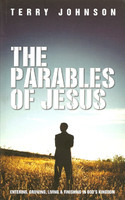Thomas Shepard (1605-1649) was a person of great learning, a hard student, an admirable preacher, and an excellent writer. Originally published in 1659 from sermon notes he left behind, The Parable of the Ten Virgins calls attention to true assurance of salvation. Shepard warns against antinomianism as he carefully distinguishes believers from nonbelievers. Following Matthew 24:1-13, the first part of this work details the visible church’s preparation to meet Christ at His return, while the second half explains His coming to meet her.
Table of Contents:
Part 1
1. General Scope of the Parable
2. The Visible Church
3. The Coming of Christ and the Security of Professors
4. The Soul that will enjoy Communion with Christ must be divorced from all other Lords, particularly from Lusts and from the Law. The Manner of its Espousals unto Christ
5. The Marks and Signs whereby the Soul may know whether he be in League or Love with any Lust or Creature, or married to the Law
6. Motives and Arguments to persuade us into the Love of Christ, and to be espoused to him
7. All Power for Spiritual Work from Christ
8. Christian’s Duty of being constantly ready to meet Christ, and to enjoy Communion with him
9. A fourfold Exhortation to Believers
10. The Soul’s immediate Closing with the Person of Christ, as the proper Object of saving Faith
11. True Believers do with Hope expect the Second Coming of Christ
12. Believers do long and desire for the Appearance and Second Coming of Christ
13. There are Hypocrites in the best and purest Churches
14. A Discovery of Gospel Hypocrites
15. There is a vast Difference between a Sincere Christian and the Closest Hypocrite
16. The Hypocrisy of the Heart proceeds from a Want of saving Illumination in the Understanding
17. Hypocrites discover themselves in an ineffectual Use of the Means of Grace
18. The Hearts and Souls of Believers are made as Vessels only for the Reception of Christ, his Spirit, and the Graces thereof
19. The Holy Spirit is in Believers as the Principle of their Spiritual Life and Holiness
20. There is such a Fullness or Measure of Grace in the Heart of Believers, which the most refined Hypocrites never arise unto
21. A more extended Account of that Fullness of Grace that is in Believers, and how the most glorious Hypocrites come short of it
22. True Saving Grace in the Hearts off Believers can never fail
Part 2
1. Carnal Security in Virgin Churches
2. Carnal Security comes by Degrees
3. Security the last Sin of Good and Bad
4. Christ’s Absence the Cause of Security in his Churches
5. Christ’s Awakening Cry before his Coming
6. The Certainty of Christ’s Coming
7. God’s Compassion towards Wise and Foolish Virgins
8. Christ’s Coming and his awaking Sleeping Christians
9. Christians trimming their Lamps, and Holiness the Christian’s Glory
10. Counterfeit Grace is not lasting
11. Unregenerate Persons may have a Sense of their Want of Grace
12. The Desire of Grace that may be in Hypocrites
13. The Desires and Endeavors of Hypocrites after Grace are not lasting
14. The Grace of one Person will not advantage another that wants Grace himself, and the best Christians can not dispense Grace to those that want it
15. The plentiful Dispensing of Grace in the Gospel Ministry
16. Concerning Christ’s Coming
17. Christ’s Coming as a Bridegroom to his own
18. Christ will not tarry when once his Time is come, and the Folly of such whose Work is then to do; and the Blessedness of Saints consists in immediate Communion with Christ
19. None shall enjoy Christ hereafter, but those that are prepared here
About the Author
Thomas Shepard was a person of great learning, a hard student, and admirable preacher, and an excellent writer. Educated at Emmanuel College, Cambridge, at the age of fifteen, he became lecturer at Earls Colne in Essex until he was silenced for non-conformity. He fled to Boston where he was pastor of the church at Cambridge and is credited for having stopped the progress of the antinomian heresy from breaking out in the new colony. Shepard was also involved in the founding of Harvard University and was instrumental in having it placed in Cambridge.
Endorsement
"This work is valuable in inverse proportion to its readability. Don't read it. Study it, a few pages at a time; decipher it. Live with it. Die with it. It may not save you, but it will leave you in no doubt if you are saved, and even less if you are not!" - Dr. John Gerstner






